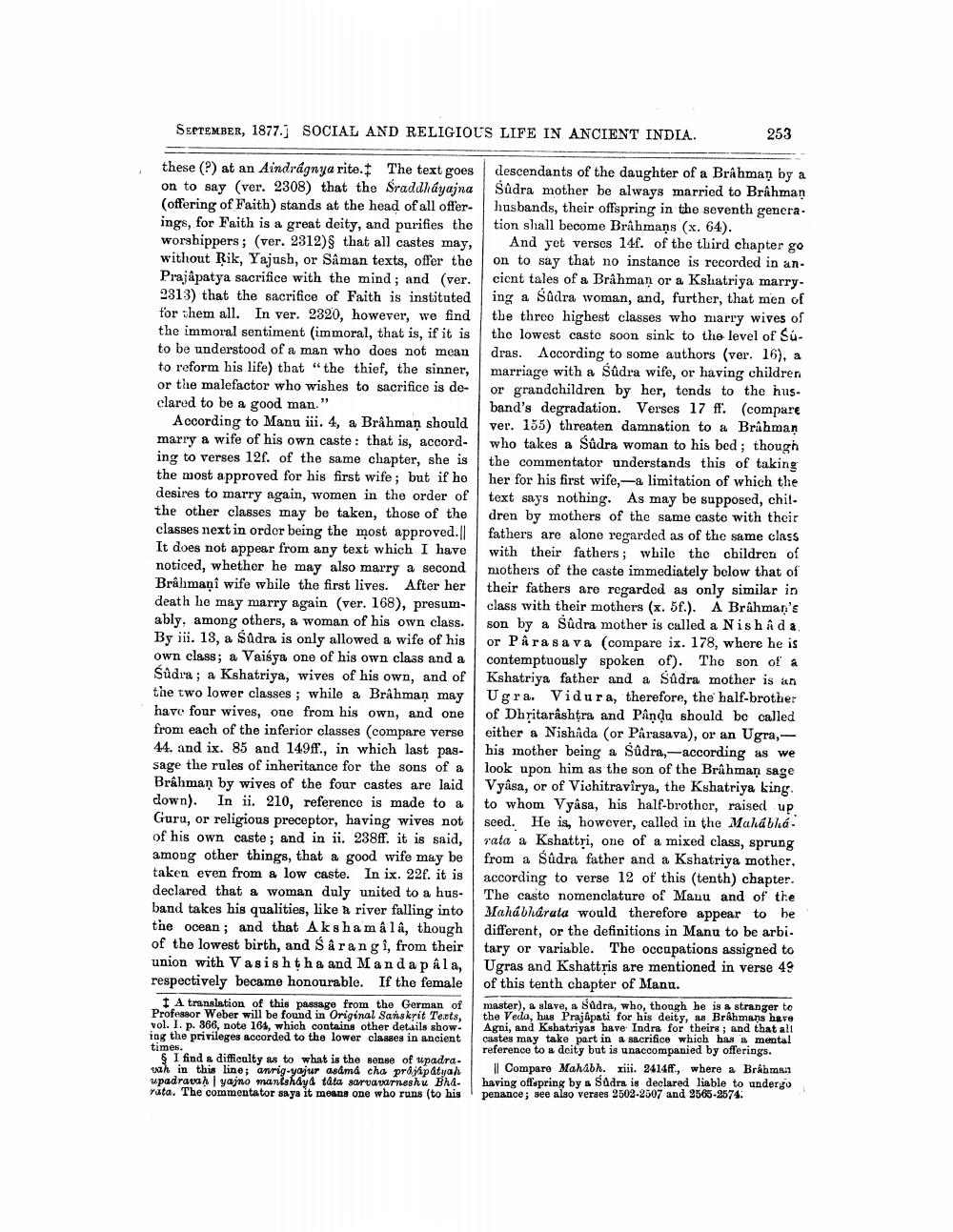________________
SEPTEMBER, 1877.] SOCIAL AND RELIGIOUS LIFE IN ANCIENT INDIA.
253
these (?) at an Aindragnya rite. The text goes descendants of the daughter of a Brahman by a on to say (ver. 2308) that the Sraddhayajna Sûdra mother be always married to Brahman (offering of Faith) stands at the head of all offer husbands, their offspring in the seventh genera. ings, for Faith is a great deity, and purifies the tion shall become Brahmans (x. 64). worshippers; (ver. 2312)S that all castes may, And yet verses 14f. of the third chapter go without Rik, Yajush, or Saman texts, offer the on to say that no instance is recorded in an. Prajapatya sacrifice with the mind; and (ver. cicnt tales of a Brahman or a Kshatriya marry. 2313) that the sacrifice of Faith is instituted ing a Sûdra woman, and, further, that men of for them all. In ver. 2320, however, we find the three highest classes who marry wives of the immoral sentiment (immoral, that is, if it is the lowest casto soon sink to the level of Suto be understood of a man who does not mean dras. According to some authors (ver. 16), a to reform his life) that "the thief, the sinner, marriage with a Sûdra wife, or having children or the malefactor who wishes to sacrifice is de- or grandchildren by her, tends to the hus. clared to be a good man."
band's degradation. Verses 17 ff. (compare According to Manu iii. 4, a Brahman should ver. 155) threaten damnation to a Brahman marry a wife of his own caste: that is, accord- who takes a Sûdra woman to his bed; though ing to verses 12f. of the same chapter, she is the commentator understands this of taking the most approved for his first wife; but if he her for his first wife,-a limitation of which the desires to marry again, women in the order of text says nothing. As may be supposed, chil. the other classes may be taken, those of the dren by mothers of the same casto with their classes next in order being the most approved. || fathers are alone regarded as of the same class It does not appear from any text which I have with their fathers; while the children of noticed, whether he may also marry a second mothers of the caste immediately below that of Brâhmaņi wife while the first lives. After her their fathers are regarded as only similar in death he may marry again (ver. 168), presum- class with their mothers (x. 5f.). A Brahman's ably, among others, a woman of his own class. son by a Sudra mother is called a Nish â da, By iii. 13, a Sudra is only allowed a wife of his or Parasa va compare ix. 178, where he is own class; a Vaisya one of his own class and a contemptuously spoken of). The son of a Sudra; a Kshatriya, wives of his own, and of Kshatriya father and a Sûdra mother is an the two lower classes; while a Brahman may ! Ugra. Vidura, therefore, the half-brother have four wives, one from his own, and one of Dhritarashtra and Pandu should be called from each of the inferior classes (compare verse either a Nishada (or Parasava), or an Ugra, - 44. and ix. 85 and 149ff., in which last pas his mother being a Sûdra, -according as we sage the rules of inheritance for the sons of a look upon him as the son of the Brûhman sage Brâhman by wives of the four castes are laid Vyasa, or of Vichitravîrya, the Kshatriya king down). In ii. 210, reference is made to a to whom Vyasa, his half-brother, raised up Guru, or religious preceptor, having wives not seed. He is, however, called in the Mahábhá. of his own caste; and in ii. 238ff. it is said, rata a Kshattri, one of a mixed class, sprung among other things, that a good wife may be from a Súdra father and a Kshatriya mother, taken even from a low caste. In ix. 22. it is according to verse 12 of this (tenth) chapter. declared that a woman duly united to a hus. The casto nomenclature of Manu and of the band takes his qualities, like a river falling into Mahabharata would therefore appear to be the ocean; and that Aksham âlâ, though different, or the definitions in Manu to be arbi. of the lowest birth, and sarangi, from their tary or variable. The occapations assigned to union with V asish tha and Manda pala, Ugras and Kshattris are mentioned in verse 49 respectively became honourable. If the female of this tenth chapter of Mana.
1 A translation of this page from the German of master), a slave, a Sodra, who, though he 18 stranger to Professor Weber will be found in Original Sanskrit Terts, the Vedla, his Prajapati for his deity, as Brahmans have vol. 1. p. 366, note 164, which contains other details show. Agni, and Kshatriyas have Indra for theirs and that all ing the privileges accorded to the lower classes in ancient castes may take part in a sacrifice which has a mental
reference to a deity but is unaccompanied by offerings. $ I find a difficulty as to what is the sense of upadra. wah in this line; anrig.yajur asma cha prajipatuan
Uompare anaon. l. 1., where a brabmail wpadravah l yajno manishaud tata sarvavarneshu Bhd. having offspring by a Sadra is declared liable to under.ro rata. The commentator says it moans one who runs (to his penance; see also verses 9502-2007 and 9606-3674.
times.




